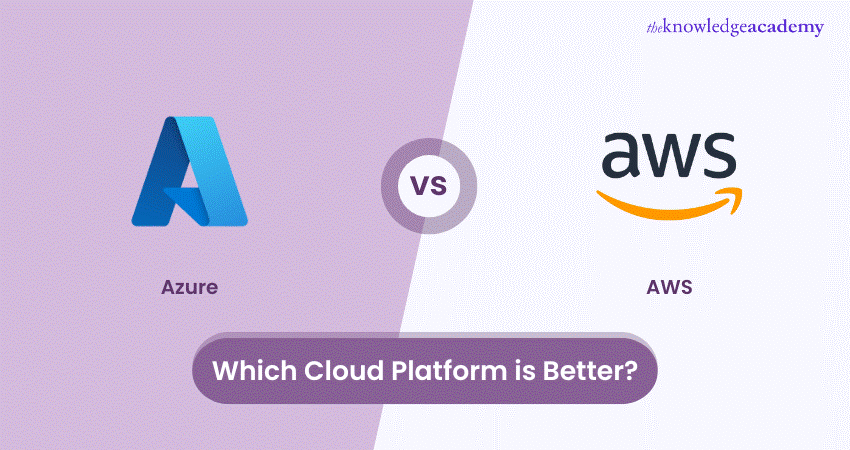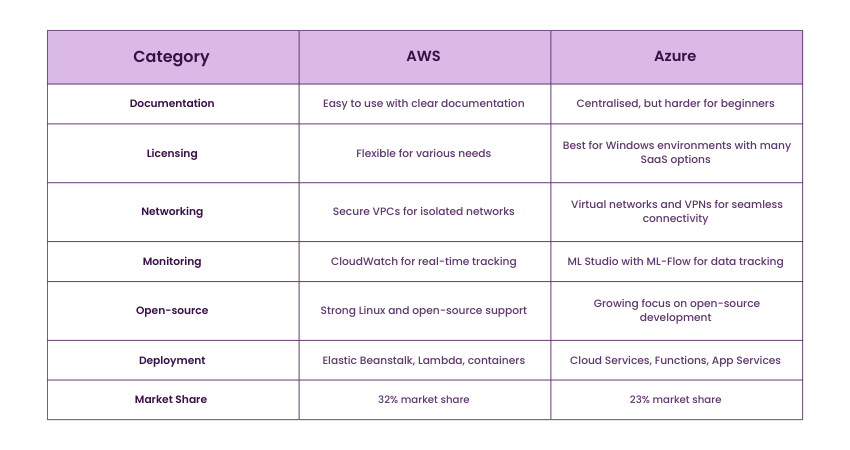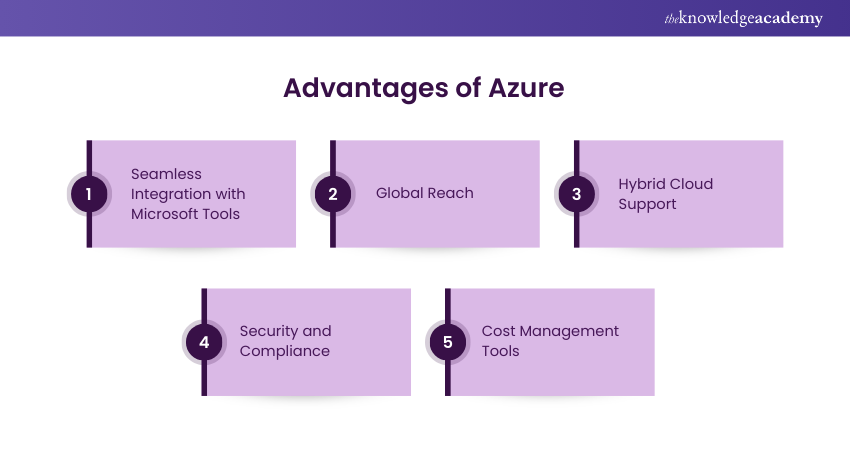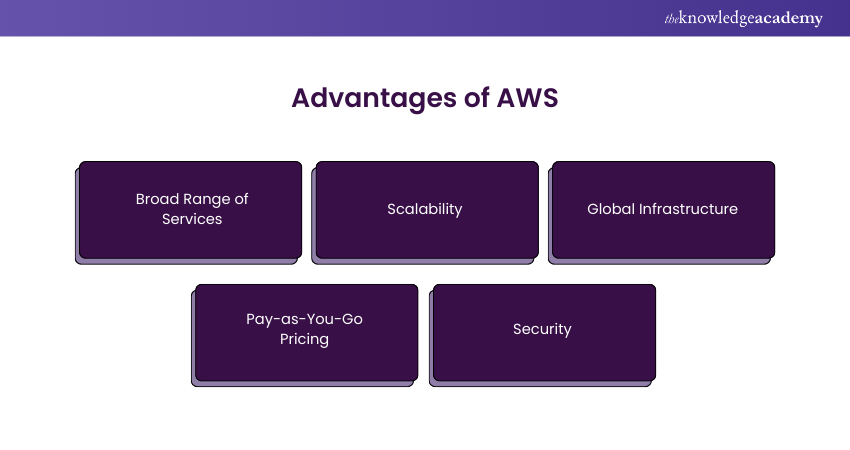We may not have the course you’re looking for. If you enquire or give us a call on +55 8000201623 and speak to our training experts, we may still be able to help with your training requirements.
Training Outcomes Within Your Budget!
We ensure quality, budget-alignment, and timely delivery by our expert instructors.

When it comes to cloud computing, the debate between AWS vs Azure is inevitable. These two giants offer a vast array of powerful tools and services for businesses of all sizes. But how do you decide which one is right for you?
In this blog, we’ll dive into the differences between AWS vs Azure, comparing their features, benefits, job prospects, certifications, and pricing. Whether you’re a beginner or looking to broaden your expertise, this guide will help you navigate the differences and decide which cloud platform best meets your needs.
Table of Contents
1) What is AWS?
2) What is Azure?
3) AWS vs Azure: Which is better?
4) AWS vs Azure: Job Opportunities
5) Azure vs AWS: Certifications
6) Azure vs AWS: Advantages
7) Azure vs AWS: Disadvantages
8) Azure or AWS - Which is better in terms of Pricing?
9) Conclusion
What is AWS?
AWS, or Amazon Web Services, is a cloud platform provided by Amazon that offers various services like storage, computing power, and databases over the internet. Instead of managing physical servers, businesses can use AWS to run applications, store data, and perform tasks remotely. It provides a flexible, scalable, and cost-effective way to handle IT needs. AWS is widely used by companies of all sizes to build and manage their online operations efficiently.
What is Azure?
Azure or Microsoft Azure is a cloud platform offered by Microsoft. It offers a variety of services like storage, networking solutions, developer tools, etc. Azure offers services in three different categories – Software as a Service (SaaS), Platform as a Service (PaaS), and Infrastructure as a Service (IaaS). It hosts web applications with the help of Microsoft’s data centers.
AWS vs Azure: Which is better?
Now that we know what Azure and AWS are, we can say that they seem pretty similar. While it might seem so on the surface, they are actually quite different. Let’s look at some of the key differences between Azure and AWS:

Documentation and Simplicity of Use
AWS offers a range of services with user-friendly interfaces, making it easy to find tools for any requirement. Each service comes with detailed descriptions, helping users understand how everything works and simplifying their experience.
In contrast, Azure centralises account details, which enhances administrative efficiency. However, users sometimes struggle with the accessibility and clarity of Azure’s documentation, which can hinder the learning process for newcomers. Despite these challenges, both AWS and Azure are evolving to meet the requirements of users in the dynamic Ccloud Computing landscape.
Licensing and License Mobility
AWS offers the most flexible licensing model that meets all the user's needs through a wide range of features and services. Conversely, Azure focuses primarily on Windows Administrators, providing ease of integration and convenience in Windows-based environments. Azure also boasts a broad selection of SaaS options, giving customers a vast pool of cloud-based applications to choose from.
AWS users benefit from a comprehensive and flexible feature set. Meanwhile, if a user seeks a Windows-based environment with easy integration and extensive SaaS options, Azure is the preferred choice.
Networking and Content Delivery
AWS allows the establishment of secure and isolated networks in the cloud with Virtual Private Clouds (VPCs), enabling precise control over the network environment. In contrast, Azure facilitates both intra- and inter-network communication through virtual networks and VPN gateways, providing a flexible and scalable solution for securely connecting on-premises and cloud resources.
While AWS's VPCs offer robust control over network configurations, Azure's virtual networks and VPN gateways ensure seamless integration between on-premises and cloud environments, meeting diverse networking needs and preferences in the Cloud Computing landscape.
Logging and Monitoring
AWS employs CloudWatch, a comprehensive monitoring and logging service, to track performance metrics and monitor resource usage in real-time. On the other hand, Azure's ML Studio utilises ML-Flow to efficiently capture and track data, facilitating the management of machine learning experiments and workflows in a collaborative environment.
Open-source Development
AWS caters to the needs of open-source developers by providing strong support for Linux and integrating various open-source applications, creating an open and supportive environment for open-source development.
Conversely, Azure is gradually adopting open-source development practices, demonstrating a commitment to evolving alongside the open-source community and expanding its service offerings to meet their needs.
Processes for Deploying Applications
AWS encompasses a variety of services, from Elastic Beanstalk to Lambda and container services, offering diverse options for application hosting. In contrast, Azure provides deployment flexibility through Cloud Services, Container Services, Functions, Batch, and App Services, catering to different application hosting needs. Both platforms deliver flexibility and scalability in their deployment options, allowing users to choose the method that best suits their specific requirements and preferences.
Cloud Market Growth
According to Canalys, in Q1 of 2022, AWS controlled 32% of the entire market. Meanwhile, Microsoft Azure took 2nd place with a 23% market share. This is followed by Google Cloud, which has a 10% market share. These cloud vendors together account for 65% of total spending. Even though AWS is leading the market share, it is facing pressure from the economic shifts around the world and the increasing popularity of multi-cloud strategy.
AWS vs Azure: Job Opportunities
When comparing job opportunities for Azure and AWS, both platforms offer promising career prospects, but there are some differences:
AWS
a) Market Share: AWS holds a larger market share, which translates to more job listings and opportunities.
b) Job Listings: There are over 300,000 job listings for AWS-related roles on platforms like LinkedIn.
c) Certifications: AWS Certifications are highly valued and can lead to increased salaries and better job prospects.
Azure
a) Integration with Microsoft: Azure is preferred by organisations that are heavily invested in Microsoft products, which can create niche job opportunities.
b) Job Listings: There are around 200,000 job listings for Azure-related roles.
c) Growth: Azure is rapidly growing, and its demand is increasing, especially for roles involving Microsoft technologies.
Learn how to build solutions with our Microsoft Azure Fundamentals AZ-900 Certification -Join today!
Azure vs AWS: Certifications
Both Azure and AWS offer various certifications according to an individual’s experience and professional domain. Here’s a list of certifications:
Azure Certifications
1) Microsoft Azure Fundamentals
2) Microsoft Azure Administrator
3) Developing Solutions for Microsoft Azure
4) Designing Microsoft Azure Infrastructure Solutions
5) Microsoft Azure Security Technologies
6) Microsoft Azure AI Fundamentals
7) Data Engineering on Microsoft Azure
8) Troubleshooting Microsoft Azure Connectivity
9) Microsoft Azure Big Data Analytics Solutions
10) Administering Windows Server Hybrid Core Infrastructure
AWS Certifications
1) AWS Cloud Practitioner
2) AWS Associate Solutions Architect
3) AWS Professional Solutions Architect
4) AWS Professional DevOps Engineer
5) DevOps Engineering on AWS – Professional
6) AWS Machine Learning
7) AWS Advanced Networking
8) AWS Certified Security Specialty
9) Introduction To AWS Security
10) AWS Cloud9 Training
Azure vs AWS: Advantages
Let’s explore the advantages of Azure and AWS.
Advantages of Azure

a) Seamless Integration with Microsoft Tools: Azure easily integrates with other Microsoft products like Office 365 and Windows Server. This makes it a great choice for businesses already using Microsoft services. The integration reduces setup time and improves compatibility.
b) Global Reach: Azure has data centers all around the world, allowing for better performance and lower latency. This means users can access data quickly from different locations. It also helps businesses comply with regional data regulations.
c) Hybrid Cloud Support: It offers strong hybrid cloud capabilities, meaning you can connect your on-premises data centre to the cloud. This flexibility helps businesses transition to the cloud at their own pace. It also allows for greater control over data and security.
d) Security and Compliance: It provides top-notch security features and is compliant with numerous industry standards. It offers tools like encryption and multi-factor authentication to protect your data. This makes it suitable for businesses in highly regulated industries.
e) Cost Management Tools: It includes built-in tools to help track and manage cloud spending. These tools allow businesses to monitor usage and adjust resources to save costs. This helps in budgeting and avoiding unexpected expenses.
Advantages of AWS

a) Broad Range of Services: AWS offers a wide variety of cloud services, from computing power to machine learning. This allows businesses to choose from many options that best suit their needs. The large selection makes AWS highly versatile for different industries.
b) Scalability: It enables easy scaling of resources, allowing businesses to grow without worrying about infrastructure limits. You can increase or decrease computing power and storage based on demand. This flexibility makes AWS ideal for businesses of all sizes.
c) Global Infrastructure: It has one of the largest global networks of data centres. This ensures fast access to applications and data from anywhere in the world. The broad infrastructure supports high availability and disaster recovery.
d) Pay-as-You-Go Pricing: With AWS, you only pay for the resources you use, which helps control costs. This model allows businesses to avoid large upfront investments in hardware. It also offers pricing options that fit different usage levels and needs.
e) Security: AWS offers strong security features, including encryption, identity management, and compliance certifications. The platform is built with security as a priority to protect data and applications. This makes it a trusted option for businesses handling sensitive information.
Learn elastic compute cloud with AWS Associate Solutions Architect Training – Join today!
Azure vs AWS: Disadvantages
Here are the disadvantages of Azure and AWS.
Disadvantages of Azure
a) Complex Pricing Structure: Azure's pricing can be difficult to understand, with many different tiers and options. This complexity makes it hard for businesses to predict their costs. As a result, some users may face unexpected expenses.
b) Learning Curve: It has many services, and learning how to use them effectively can take time. Businesses may need to invest in training for their teams to get the most out of the platform. This can slow down adoption and increase initial costs.
c) Performance Issues in Some Regions: Depending on your location, Azure may not always perform at its best. In certain regions, latency and downtime could be a problem. This can affect the speed of your applications.
Disadvantages of AWS
a) Data Transfer Costs: While storage costs in AWS are affordable, transferring data out of AWS can be expensive. Businesses that need to move large amounts of data frequently might find these charges add up. This can make AWS less cost-effective for high-volume data transfers.
b) Service Limitations for Smaller Businesses: It is designed with large-scale operations in mind, which may lead to overcomplicated solutions for smaller businesses. Some services and features might be too advanced or unnecessary for smaller teams. This can result in paying for resources that aren’t fully utilised.
c) Potential Vendor Lock-in: Once integrated deeply with AWS services, it can be difficult to migrate to another platform. Moving data and applications to another provider may involve high costs and time. This creates a reliance on AWS, making it hard to switch in the future if needed.
Azure or AWS - Which is better in terms of Pricing?
Cost is a major factor for organisations moving to the cloud. With competition among cloud providers, prices have been decreasing. Both AWS and Azure offer free introductory tiers with limited usage to let users try their services before committing. They also provide credits to attract start-ups.
AWS:
a) Billing: Traditionally charged hourly, but now offers per-second billing for many services, making it cost-efficient for short-term use.
b) Pricing Model: Pay-as-you-go with options like Reserved Instances (discounts for long-term commitments), On-Demand Instances (no upfront cost), and Spot Instances (discounts for unused capacity).
Azure:
a) Billing: Charges per minute for most services, but some also use per-second billing.
b) Pricing Model: Pay-as-you-go with flexible options like Reserved VM Instances, Spot VMs, and Azure Hybrid Benefit (cost savings using existing licenses).
|
Aspect |
AWS |
Azure |
|
Billing Criteria |
Per-second billing for some services |
Per-minute billing for most services |
|
Pricing Model |
Pay-as-you-go with various options |
Pay-as-you-go with flexible options |
|
Reserved Instances |
Available with upfront payment |
Available with upfront payment |
|
On-Demand Instances |
Pay by the hour |
Pay by the minute |
|
Spot Instances |
Bid for unused capacity at a discount |
Bid for unused capacity at a discount |
|
Hybrid Benefits |
Not applicable |
Azure Hybrid Benefit for BYOL and reserved VMs |
Ultimately, AWS offers more flexibility and potential savings with increased usage while Azure provides competitive pricing but with slightly less flexibility in its pricing model. Both platforms have their strengths, so the best choice is based on your needs and usage patterns.
Start your journey to mastering cloud computing with Microsoft Azure Certification. Register today!
Conclusion
Both AWS and Azure offer powerful cloud solutions, each with its own advantages and drawbacks. AWS provides a range of services and scalability, but its pricing and complexity may be challenging for some businesses. Azure, on the other hand, integrates well with Microsoft tools and offers strong hybrid cloud support, though its pricing can also be confusing. When deciding between AWS vs Azure, businesses should consider their specific needs, budget, and how each platform fits into their existing systems.
Learn foundational AWS cloud concepts with our AWS Cloud Practitioner Training – Join today!
Frequently Asked Questions

AWS and Azure are both good for your career. Choose one based on your interests and job opportunities in your area. Both offer certifications to help you advance in your AWS career.

AWS is popular because it is user-friendly, has flexible licenses and supports open-source apps. It offers diverse services like VPCs for secure networks and tools for easy app deployment.

The Knowledge Academy takes global learning to new heights, offering over 30,000 online courses across 490+ locations in 220 countries. This expansive reach ensures accessibility and convenience for learners worldwide.
Alongside our diverse Online Course Catalogue, encompassing 19 major categories, we go the extra mile by providing a plethora of free educational Online Resources like News updates, Blogs, videos, webinars, and interview questions. Tailoring learning experiences further, professionals can maximise value with customisable Course Bundles of TKA.

The Knowledge Academy’s Knowledge Pass, a prepaid voucher, adds another layer of flexibility, allowing course bookings over a 12-month period. Join us on a journey where education knows no bounds.

The Knowledge Academy offers various AWS Certification Courses, including AWS Certification Practitioner, AWS Associate Solutions Architect Training and AWS Professional Solutions Architect Training. These courses cater to different skill levels, providing comprehensive insights into AWS Projects.
Our Cloud Computing Blogs cover a range of topics related to AWS, offering valuable resources, best practices, and industry insights. Whether you are a beginner or looking to advance your AWS skills, The Knowledge Academy's diverse courses and informative blogs have you covered.
Upcoming Cloud Computing Resources Batches & Dates
Date
 AWS RoboMaker Training
AWS RoboMaker Training
Fri 10th Jan 2025
Fri 14th Feb 2025
Fri 11th Apr 2025
Fri 13th Jun 2025
Fri 8th Aug 2025
Fri 26th Sep 2025
Fri 21st Nov 2025







 Top Rated Course
Top Rated Course



 If you wish to make any changes to your course, please
If you wish to make any changes to your course, please


